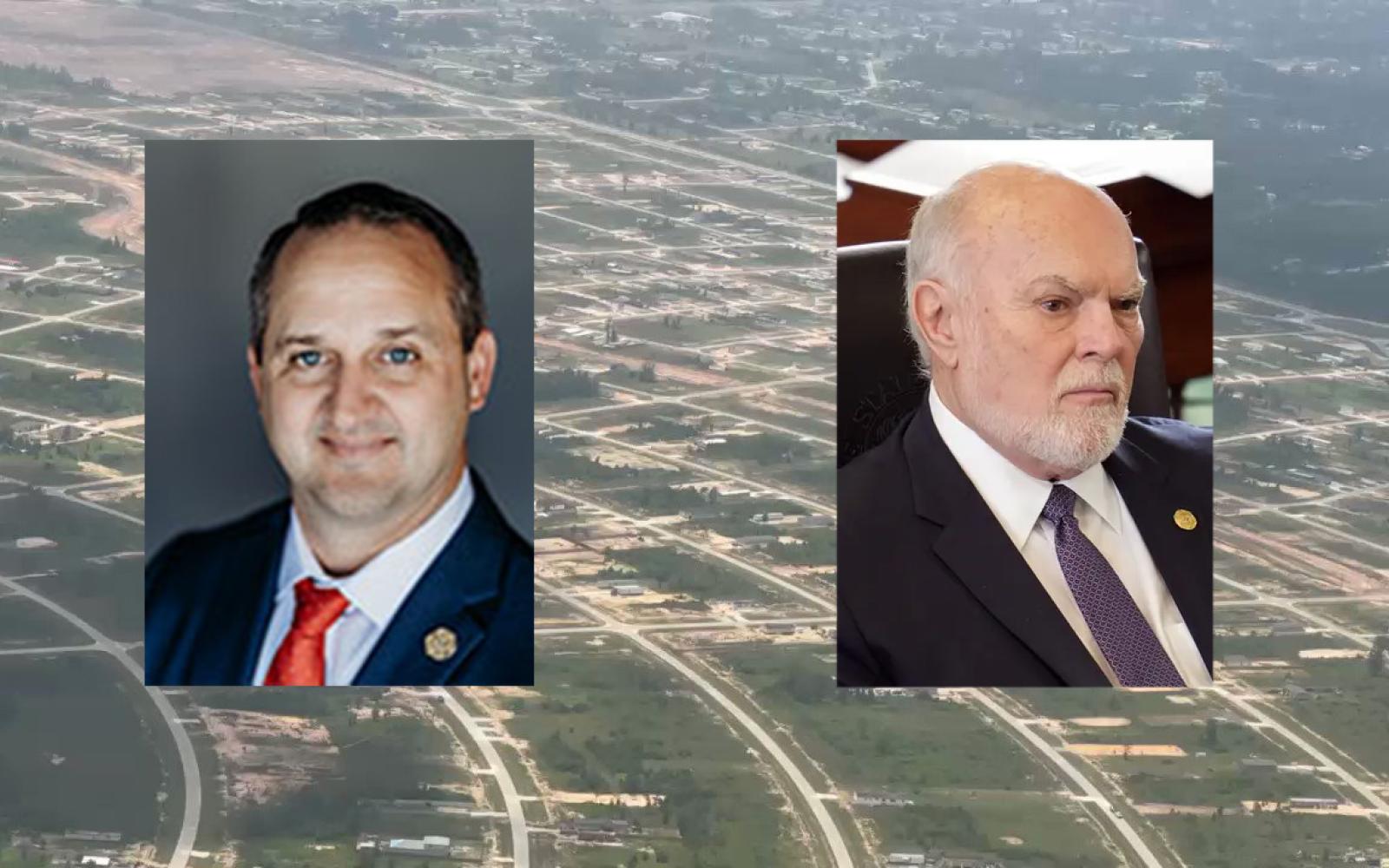AUSTIN, TX — Texas Attorney General Ken Paxton released a study highlighting a significant residential development known as Colony Ridge in rural East Texas, in Liberty County. In his report, Paxton fingered two Republican lawmakers for making the development possible. This development has drawn attention due to its massive scale and implications for the region. In this article, we will delve into the details of this residential project and some of the concerns it has raised.
Republican State Rep. Brian Babin (District 26, Katy and Richmond) recently stated that Colony Ridge spans an astonishing 32,000 acres, covering an area equivalent to 50 square miles. This vast development is home to over 40,000 residents, making it a community of considerable size in Liberty County with only 91,000 total population. What's particularly noteworthy is the impact this growth has had on the local school district in Cleveland, which serves the Colony Ridge area. According to the Houston Chronicle, this school district has experienced the fastest growth rate in the state of Texas. In 2019, the school district received an additional $1,000 per student, totaling $7 million, from the state government to support its public schools.
Earlier this month, Ben Shapiro, of Daily Wire exposed the Colony Ridge development as a haven for illegal migrants and drug cartels. Watch:
There's an Actual COLONY for Illegal Immigrants — A Texas land developer has established Colony Ridge, a sprawling settlement north of Houston where thousands of illegal immigrants are believed to have settled. Things are going spectacularly.
Typically, rapid growth in an area is accompanied by commercial and industrial development that helps alleviate the financial burden on local school districts. However, in this case, the Colony Ridge development has strained the state education budget and, consequently, Texas taxpayers. Additionally, there are concerns about the increased load on the county's civil court system due to various matters related to the development.
Below is a video Overview of Colony Ridge by the author of the book that discusses the development, titled, Overrun: How Joe Biden Unleashed the Greatest Border Crisis in U.S. History:
One notable aspect of the Colony Ridge project is its financing model, known as the "Uncle Slaton" owner finance plan, which involves selling lots with owner financing at a 13 percent interest rate over a 20-year period, as reported by Texas Monthly. This financing method allows the developers to bypass traditional banking institutions, which typically require borrowers to be U.S. citizens with Social Security numbers. Over the past year, the developers have foreclosed on approximately 3,100 Colony Ridge properties, accounting for 95 percent of all foreclosures in Liberty County. To put this in perspective, Tom Green County, for instance, experiences fewer than 300 foreclosures annually from its monthly foreclosure sales on the courthouse steps.
Despite the criticisms and concerns, the developers, consisting of brothers Trey and John Harris and their cousin Kevin Harris, argue that Colony Ridge provides an opportunity for their clients to achieve the American Dream, which might otherwise be unattainable due to poor or nonexistent credit.
It's worth noting that Trey Harris has been a significant contributor to the political campaign of Governor Greg Abbott, with donations totaling $1.4 million. He has vigorously defended the development against claims that it attracts illegal immigrants and drug cartels. Some have drawn parallels between the controversy surrounding Colony Ridge and the "Jade Helm" conspiracy theory from 2015, which speculated that President Obama's military exercises in rural Texas were a precursor to military action against rural citizens.
Setting aside conspiracy theories, the close ties between the Harris family and Governor Abbott's campaign have raised questions. He may not be the only Republican politician involved, however. In his letter, Attorney General Paxton pointed out that two Republican legislators representing Liberty County, State Senator Robert Nichols (SD 3) and State Rep. Ernest Bailes (HD 18), sponsored legislation via consent agendas that benefitted the Colony Ridge development.
Specifically, Paxton noted that the Municipal Management District ("MMD") authority was granted to create favorable conditions for Colony Ridge, effectively allowing it to operate as its own city. This arrangement deviates significantly from the original intent of MMDs, according to Paxton.
The Texas Legislature is currently in a special session, where hearings on Colony Ridge are underway, because Governor Abbott added the matter to the session's agenda. The House committee is considering new legislation, such as HB 178, which would require disclosure of the buyer's identity and immigration status in certain real estate transactions, including property purchases and residential leases. This means that individuals wishing to buy or lease property in Texas may be required to demonstrate a "right to work" in the U.S.
Politics needs humor sometimes. Conservative radio jock Michael Berry (Houston) released this fake advertisement for Colony Ridge:
A Daily Wire reporter provided screenshots of ads for Colony Ridge. Although the developers claimed their marketing efforts centered around Houston, the call to action in this ad is to contact the sales office via WhatsApp. The use of WhatsApp avoids long distance charges for international calls, suggesting that Colony Ridge markets its development to potential migrants who haven't yet reached U.S. soil:
There's more political drama surrounding State Rep. Bailes and Senator Nichols. This year, Bailes voted to impeach Paxton in the House and Nichols was one of only two Republican senators to vote to convict Paxton of bribery.
For a comprehensive understanding of the issue, you can read Attorney General Ken Paxton's entire letter to the Texas Congressional Delegation:
Dear Members of Congress,
Thank you for your September 30 letter concerning the rapidly expanding Liberty County development known as Colony Ridge, which has become an issue of national concern. I write today to share the Office of the Attorney General’s findings and analysis.
The development appears to be attracting and enabling illegal alien settlement in the state of Texas and distressing neighboring cities and school districts. Complaints from nearby communities about the development’s scale of growth and unmanageable externalities reveal that this unincorporated settlement has drawn far too many people and enabled far too much chaos for the current arrangement to be tolerated by the state.
Texas has seen a growing trend of real estate developers buying huge quantities of undeveloped land, creating primitive subdivisions, and selling the bare lots in a practice often paired with offering minimal- down-payment, high-interest owner-financed loans. These loans require little identity verification. Lax development codes for unincorporated areas mean residents can crowd onto a property and the residential population can expand quickly. This form of real estate development and financing has created an attractive opportunity for noncitizens to cross the border and settle in Texas, with fast-growing developments the size of entire cities forcing nearby areas to struggle to adapt to—and even subsidize— the influx of new residents enriching the developers. The scale of the Colony Ridge development has proved unmanageable for effective law enforcement and other key standards of acceptable governance. Violent crime, drug trafficking, environmental deterioration, public disturbances, infrastructure overuse, and other problems have plagued the area and nearby towns.
Upon investigation, the Office of the Attorney General found that Colony Ridge in particular was made possible by a specific arrangement created by Senator Robert Nichols and Representative Ernest Bailes. Municipal Management District (“MMD”) authority was specifically granted to create an advantageous carve-out for the Colony Ridge development to act virtually as its own city. This is a substantial deviation from lawmakers’ original intent for MMDs.
In 1991, the legislature created Municipal Management District authority through Chapter 375 of the Texas Local Government Code. Legislative Findings and Purposes in Chapter 375 generally show that MMDs were intended to be used to revitalize already-developed urban commercial areas, rather than to develop raw land. MMDs were originally used as an extension of city government, providing tax authority to residents to beautify their communities and improve local economic conditions. In 2017, Representative Ernest Bailes and Senator Robert Nichols specifically took action on behalf of Colony Ridge to enact HB 4341 (Chapter 3795 of the Special District Local Laws Code) which established a small, five-acre Municipal Management District from undeveloped land in Liberty County. Critically, this MMD was surrounded by countless more acres of undeveloped land owned by a real estate developer whom the statute made President of the MMD Board of Directors and who remains in that role. Four of the five current board members work for Colony Ridge. The five-acre MMD controlled by Board President “Trey” Harris then annexed tens of thousands of acres of land also owned by Mr. Harris. Thus, rather than being a small urban revitalization district, it is a sprawling, highly populated settlement that will soon outpace the population of many cities in Texas yet is ungoverned by any meaningful authority other than the developers whose primary interest is selling more property to new residents.
MMDs have taxation authority and can issue tax-exempt bonds, meaning the entity can raise money and finance its own growth without a bank scrutinizing its high-risk activities that may contradict the public interest. Further, a growing town would typically incorporate into a nearby area before growing to this scale. Instead, the managers of this district function as the unelected, unaccountable leaders of a city that is inhabited by an unknown population including unvetted foreign aliens and whose unsustainable growth is protected by a specific state carve-out. The burden displaced onto the surrounding areas to subsidize public services needed by those residing in Colony Ridge is significant. The true costs of the development are often borne by the rest of the people of Texas. In one example, the Cleveland Independent School District is growing faster than any other in the entire state, with Colony Ridge contributing the vast majority of that growth. The number of Cleveland ISD students has more than tripled in recent years— now over 10,000 students—and is projected to double in size again in less than ten years.
To illustrate how severely this arrangement diverges from the intent of the legislation creating MMDs, the 1991 statute says, “The creation of each [municipal management] district is necessary to promote, develop, encourage, and maintain employment, commerce, economic development, and the public welfare in the commercial areas of municipalities and metropolitan areas of this state.” Loc. Gov't Code Sec. 375.001(b). But Colony Ridge is neither a commercial area of a municipality nor a metropolitan area of the state.
According to the statute, “A [municipal management] district is designed to provide needed funding for metropolitan areas to preserve, maintain, and enhance the economic health and vitality of the areas as community and business centers.” Loc. Gov't Code Sec. 375.001(h). Colony Ridge is not a metropolitan area and the district does not promote Colony Ridge as a community or business center. In fact, in a 2019 interview, the developer insisted extra state funding was needed to accommodate the growth of residents because the area had so little commercial tax revenue relative to other parts of the state that more readily absorb population growth.
Further, the statute says, “The purpose of this chapter is to promote and benefit commercial development and commercial areas throughout the state. Each improvement project or service authorized by this chapter is found and declared to carry out a public purpose.” Loc. Gov't Code Sec. 375.001(l). But Colony Ridge's MMD does not promote or benefit commercial development or commercial areas.
I am beyond disappointed in Senator Nichols and Representative Bailes for apparently working to enrich specific developers at enormous expense to the rest of the public and reducing the quality of life for their own constituents. I have watched journalists and politicians alike downplay this problem. In lockstep, they minimize the scale, costs, and, worst of all, the unjust deprivation of self-governance endured by the people of Texas who never assented to the creation of a sprawling unincorporated, ungoverned zone that caters in no small part to other countries’ citizens but forces them to pay for the associated costs. Thank you for your attention to this matter. I commend Governor Abbott for requiring the legislature to address the issues pertaining to Colony Ridge in the Special Session. My office has coordinated with the Governor’s team to prioritize this issue, and I urge the legislature to address this growing crisis created by some of their own members’ hidden agendas. Senator Nichols and Representative Bailes created these problems with their initial legislation, and now the legislature must undo what they have tolerated in their districts for years.
Sincerely,
Ken Paxton
Texas Attorney General

Left: State Rep. Rep. Ernest Bailes (HD 18) and State Sen. Robert Nichols (SD 3). Underlay is Colony Ridge from the air from a video on X by Todd Bensman.
Subscribe to the LIVE! Daily
Required






Comments
Thank you Joe. There IS a semblance of journalism in San Angelo. Lord knows KLST, KSAN, Concho Valley Homepage and Go San Angelo are utterly clueless to the point of embarrassing.
- Log in or register to post comments
PermalinkPost a comment to this article here: